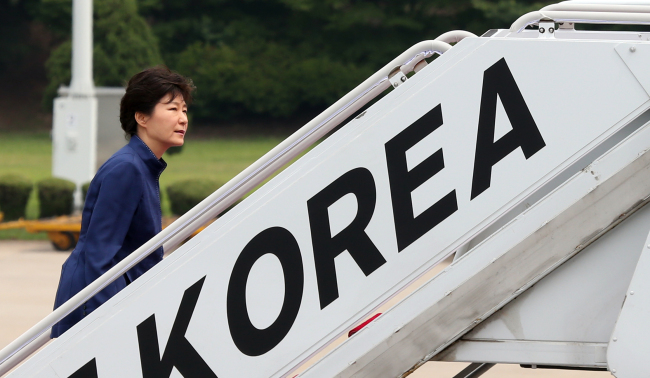South Korean President Park Geun-hye arrived in Uzbekistan on Monday to forge closer economic and other ties with the Central Asian nation once at the center of the trade route between Asia and Europe.
The three-day state visit comes as Park seeks to lay the groundwork for the “Eurasia initiative” she proposed in October.
The initiative calls for building more infrastructure and freeing up trade between Eurasian nations to create what could become a large single market rivaling the European Union.
On Tuesday, Park is scheduled to hold summit talks with Uzbek President Islam Karimov to discuss ways to deepen the two countries’ “strategic partnership” in political, economic and other affairs, presidential officials said.
The leaders are also expected to check on projects that are currently under way between the two countries and exchange views on expanding bilateral cooperation to new sectors such as renewable energy, information and communications technology, and textiles, according to the officials.
Current joint projects include the development of the Surgil gas field near the Aral Sea and the construction of a gas-chemical plant.
The joint projects are worth a total of $8 billion, the officials said.
The three-day state visit comes as Park seeks to lay the groundwork for the “Eurasia initiative” she proposed in October.
The initiative calls for building more infrastructure and freeing up trade between Eurasian nations to create what could become a large single market rivaling the European Union.
On Tuesday, Park is scheduled to hold summit talks with Uzbek President Islam Karimov to discuss ways to deepen the two countries’ “strategic partnership” in political, economic and other affairs, presidential officials said.
The leaders are also expected to check on projects that are currently under way between the two countries and exchange views on expanding bilateral cooperation to new sectors such as renewable energy, information and communications technology, and textiles, according to the officials.
Current joint projects include the development of the Surgil gas field near the Aral Sea and the construction of a gas-chemical plant.
The joint projects are worth a total of $8 billion, the officials said.

Park also plans to seek Uzbekistan’s support for her government’s foreign policy agenda, such as the “Korean Peninsula trust process,” the “Northeast Asia peace and cooperation vision” and the “Eurasia initiative.”
The visit will also be an opportunity to ensure Uzbekistan’s cooperation on Korean Peninsula issues, such as the denuclearization of North Korea, officials said.
On the sidelines, Park will meet with Korean residents and ethnic Koreans in Uzbekistan, and attend a bilateral business forum.
Uzbekistan is home to about 180,000 ethnic Koreans, the largest number among Central Asian nations, according to the officials.
During Park’s visit, the two countries are expected to discuss ways to help the Koreans preserve their historical roots and traditions while concurrently acting as a bridge between the two cultures.
South Korea will also express its commitment to actively help Uzbekistan’s sustainable development by signing a set of bilateral agreements on providing grant-type aid, the officials said.
On Wednesday, Park will visit Uzbekistan’s second-largest city of Samarkand, known for its central position on the former “Silk Road” trade route between China and the Mediterranean.
From there, she will fly to Kazakhstan for a three-day state visit that includes summit talks with Kazakh President Nursultan Nazarbayev.
The meeting will come 10 months after the two leaders met on the sidelines of a summit of the Group of 20 major economies in St.
Petersburg, Russia ― an indication of the two nations’ close and friendly ties, the officials said.
The visit will be an opportunity to support ongoing joint projects worth a total of $10 billion, including the construction of a coal-fired power plant and a petrochemical complex.
The two sides will also sign a memorandum of understanding on rail cooperation, which calls for South Korean participation in the modernization of Kazakhstan’s railways.
That project is expected to provide a basis for Park’s vision for a “Silk Road Express” that connects South Korea to Europe via North Korea, Russia and China.
The visit could also serve to highlight the economic success Kazakhstan achieved after abandoning its nuclear programs.
Kazakhstan’s per capita income has exceeded $13,000, the highest among Central Asian nations, setting an example for North Korea to follow.
Kazakhstan is the largest destination of South Korean investment in the region, with more than 250 South Korean firms operating there, according to the officials.
During Park’s visit, the two sides will sign a mutual agreement that allows nationals from one side to visit the other country for 30 days without a visa.
On the final leg of her trip, Park is scheduled to spend two days in Turkmenistan as the first South Korean president to visit the country since the two sides established diplomatic ties in 1992. (Yonhap)
-
Articles by Korea Herald









![[Hello India] Hyundai Motor vows to boost 'clean mobility' in India](http://res.heraldm.com/phpwas/restmb_idxmake.php?idx=644&simg=/content/image/2024/04/25/20240425050672_0.jpg&u=)









